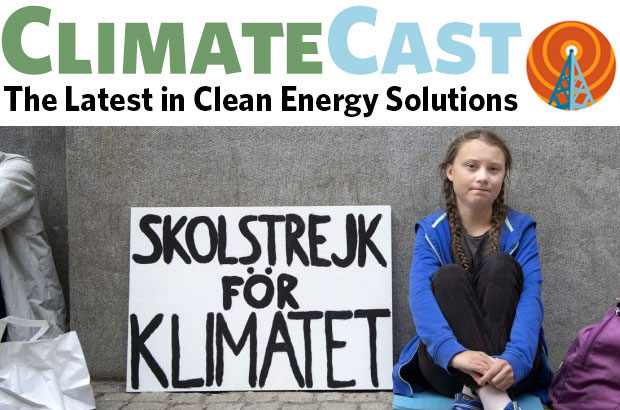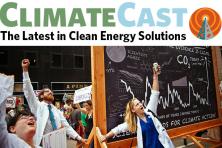Three years into the Paris agreement, climate advocates still pushing hard for progress
US states, some anyway, are charging ahead toward climate progress. 2019 may be the year that Oregon puts a price on carbon pollution, which would make it the second state to pass an economy-wide price on pollution. The proposed legislation, the Clean Energy Jobs bill, would cap and price pollution from Oregon’s top emitters. Proceeds from the price on carbon would be reinvested to fund clean energy and energy efficiency projects for homeowners, renters, farmers and small businesses, as well as helping to electrify the transportation sector, build affordable housing near transit, and more. In Washington State, Governor Jay Inslee last week proposed a number of complementary measures that would put the state on a path to 100 percent clean energy by 2045. The proposed legislation would require utilities to transition to carbon-free electricity, and for the state to implement a clean fuels standard similar to what Oregon and California already have in place. The legislation may very well pass if lawmakers are keen to listen to their constituents; recent polling shows that the November election did not temper Washington voters’ taste for climate action. Oregon and Washington aren’t the only states with big climate plans; incoming Democratic governors across the country have voiced support for increasing clean energy use and transitioning their states’ off fossil fuels.
At the federal level, the incoming Congress is bringing a new energy and renewed commitment to making climate action a federal priority. Representative-elect Alexandria Ocasio-Cortez (D-N.Y.) called climate change “the civil rights movement of our generation.” Protesters also again occupied House Minority Leader Nancy Pelosi’s office, demanding that Democrats in take a stronger stance on climate change.
On the international front, COP24 climate talks have ended in some agreement, with over 190 countries committing to measures that will make the Paris climate accord operational in 2020. This comes after two weeks of tumultuous negotiations with several notable low points, from the assembled delegates failing to adopt the language of the IPCC climate report, to the Trump administration promoting coal technology during the talks. The steps forward approved at the conference will not be enough to stop climate pollution from reaching critical levels. Countries must still do more if we are to avoid the worst impacts of global warming.
Meanwhile, back in the completely wrong direction
A New York Times investigation has revealed that Marathon Petroleum, the largest refiner in the US, worked with oil-industry groups and Charles G. Koch to run a campaign to roll back car emissions standards. If the rollbacks happen, consumers will use an additional 350,000 to 400,000 barrels of gasoline per day, according to Marathon’s CEO. The Trump administration is doing everything it can to throw coal a lifeline, despite the reality that coal consumption is on track for a four-decade low. The EPA plans to roll back an Obama-era regulation on coal plants, making it easier to build new ones. Thankfully, the courts still provide some checks and balances; a Montana judge recently halted the Keystone XL Pipeline, saying “the Trump administration completely disregarded the climate effects of building the Keystone pipeline.” In other dirty coal news, Senator Joe Manchin III (D. Va.) has secured the top Democratic spot on the Senate Energy and Natural Resources Committee, despite the fact that he received over $150,000 in campaign contributions from the oil and gas industry -- a key industry that the committee is charged with keeping in check.
Big oil and coal have left the building (or are at least on their way out)
Xcel Energy Company, which serves over 3.6 million customers in New Mexico and Michigan, has become the first major US utility to pledge to fully-phase out emissions that cause global warming. But the company stopped short of a complete commitment to clean energy—while committing to pursue its goal through renewable energy, the company may also replace some fossil fuel use with nuclear power. Xcel already runs two nuclear power plants in Minnesota. Thanks to the retirement of plants across the world, the Energy Department reports that coal consumption is at its lowest since 1979. Volkswagen, Europe’s largest carmaker, is looking to create a new North American production factory that would be dedicated exclusively to building electric vehicles.
The unstoppable clean energy movement
Cincinnati, Ohio has approved a resolution to power the city with 100 percent renewable energy by 2035. While the city itself is on the smaller side, the move is still significant: Cincinnati is the 100th US city to commit to 100 percent clean energy. In other Midwest news, a new report shows that clean energy is contributing jobs to Midwestern communities where they are needed most -- rural ones, where job opportunities are traditionally more difficult to find. Further south, the Chattanooga Metropolitan Airport is about to be become the first US airport to. run on 100 percent solar power. Chattanooga was once called “the dirtiest city in America.” On the west coast, the California Energy Commission has updated building standards to mandate that all new homes built in the state must incorporate solar power. The clean energy additions we’ve seen recently are particularly exciting in that they show systemic changes to the way we power our homes and cities. In fact, a new global analysis finds that it is now cheaper to build new clean energy than to run 35 percent of coal plants worldwide. By 2030, that percentage is projected to increase to renewables beating out 96 percent of coal-fired generation. Another report projects that the wind industry will add more than 680 gigawatts of capacity worldwide in the next decade, which would be more than double the capacity installed worldwide right now. (To put that number into context, one gigawatt of power is equivalent to 431 utility-scale wind turbines.)
A threat to life as we know it: climate impact news
New research shows that the effects of warmer Arctic temperatures are being felt here in the Pacific Northwest; warmer ocean temperatures are taking a toll on Pacific cod, which many Oregon and Washington fishing families rely on to make a living. Cod stocks in 2018 were down to around 80 percent of what they had been recently, which means new restrictions to Pacific cod fishing are likely to be put in place. Scientists have also concluded that out of Canada’s 16 Chinook populations, 13 are declining and eight are endangered. Scientists say “climate change is the overarching stressor” for the Chinook population. The effects of climate change are being felt inland, too. Oregon’s increasingly dry and warm conditions are harming the health of the state’s Christmas tree stock. This could impact holiday cheer for families across the country; Oregon is the largest state producer and exporter of Christmas trees in the nation. The impacts of climate change aren’t just being felt on land and sea, but among those who survive climate-fueled disasters. Researchers found that the more than 4,500 children displaced by the Camp Fire in California are part of a new generation that will be disproportionately traumatized as by climate disaster.
In Brief:
Last week, Climate Solutions moderated a live Twitter Q&A with Governors Jay Inslee and Kate Brown, reflecting on the current challenges for action on climate and clean energy for Northwest States. Here’s a record of that Q&A session.





